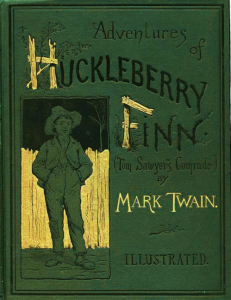There’s another big flap because the Duluth, Minnesota school board excluded “Huckleberry Finn” & “To Kill a Mockingbird” from the required curriculum because of their use of the n-word & other racist insults. Every time a school board removes the books from compulsory reading lists, a chorus of jackasses starts braying against censorship & claiming the books are classics of American literature. They’re not burning the damn books but merely replacing them in the curriculum & making them optional.
This dispute originally erupted in the late 1970s, notably after the civil rights movement, because Black school kids forced to read “Huckleberry Finn” were traumatized & often faced taunting from white schoolmates. It’s been debated by scholars for years, with many prominent Blacks like Toni Morrison defending the book. The chief offense in “Huckleberry Finn” is not that it uses the n-word but that through & through to its regrettable ending it is white supremacist literature of the white savior genre. A rascal white street kid rescues an adult runaway slave. White people swoon at that moment in the book when Huck chooses to defy society’s norm that he turn Jim over to authorities & instead help him escape up the Mississippi River. If that ain’t the very essence & origins of white savior literature & film, then what is it?
Mark Twain was a wonderful satiric short story writer but he was a racist who went AWOL as an irregular Confederate soldier, loved minstrel shows, & hated who he called “injuns.” His personal friends were former Yankee generals leading the wars of extermination west of the Mississippi. Black school kids pick up on what adult whites do not so “Huckleberry Finn” should not be imposed on little kids, white, Black, or brown, in a compulsory curriculum but should be taught as the origins of white savior literature so that this genre can be recognized & regarded with contempt.
(Photo is cover of “Adventures of Huckleberry Finn”)
{PS: On “To Kill a Mockingbird” which I recently read with my book club, I will have to reread it in the context of Black kid’s criticisms.)
